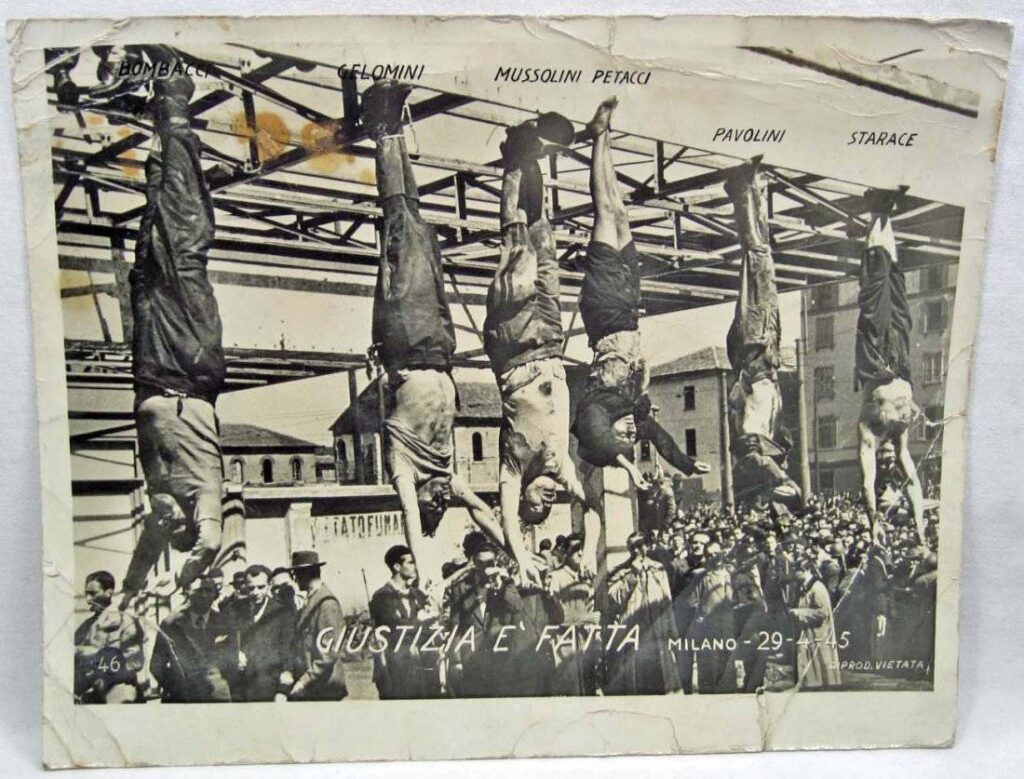On 28 April 1945, Italian dictator Benito Mussolini and his mistress, Clara Petacci, were captured and executed by Italian partisans as they attempted to flee to Switzerland. The end of Mussolini marked a critical moment in the collapse of fascism in Europe during the final days of the Second World War.
Benito Mussolini: A brief biography
Born on 29 July 1883 in Predappio, in the Romagna region of Italy, Benito Amilcare Andrea Mussolini rose from humble origins. His father was a blacksmith and an ardent socialist, heavily influencing young Mussolini’s early political views. Initially a schoolteacher, he became a journalist and quickly made a name for himself in the socialist press.
However, Mussolini’s political orientation shifted dramatically during the First World War. Advocating Italy’s intervention, he was expelled from the Socialist Party and, in 1919, founded the Fasci Italiani di Combattimento, the nucleus of what would become the National Fascist Party.
Rise to power and fascist rule
In October 1922, Mussolini capitalised on political instability and economic turmoil to lead the March on Rome, pressuring King Victor Emmanuel III to appoint him as Prime Minister. By 1925, Mussolini had dismantled parliamentary democracy and established a dictatorship, styling himself “Il Duce” (The Leader).
Under his rule, Italy pursued aggressive nationalism, censorship, suppression of political opposition, and a cult of personality. He sought to revive the grandeur of the Roman Empire, promoting imperial ambitions abroad.
Mussolini and the second World War
Mussolini aligned Italy with Nazi Germany under Adolf Hitler, forming the Rome–Berlin Axis. He entered the Second World War in 1940 on the side of the Axis powers, hoping to gain territories and bolster Italy’s international stature.
His military campaigns, however, were disastrous. Italian forces struggled in North Africa, the Balkans, and in the ill-fated invasion of Greece in October 1940. Greece not only repelled the Italian invasion but also pushed back into Albanian territory. Germany was forced to intervene in April 1941, delaying Operation Barbarossa and weakening Axis efforts on the Eastern Front.
Relations with Greece and Cyprus
Mussolini’s aggression towards Greece significantly impacted the Eastern Mediterranean. Though Cyprus was under British control at the time, Italian influence in the Dodecanese islands (seized from the Ottoman Empire and formally annexed by Italy in 1924) heightened tensions in the region. Italian ambitions often alarmed the Cypriots, who looked to Greece for protection and cultural unity.
While Cyprus itself was not directly attacked by Italian forces, Mussolini’s broader Mediterranean strategy contributed to regional instability and influenced British defensive policies on the island during the war.

Fall from power and execution
By 1943, as Allied forces advanced through Italy, Mussolini was deposed by the Grand Council of Fascism and arrested on the orders of the King. Germany rescued him and installed him as the puppet leader of the Italian Social Republic in the north, a state that existed only under German protection.
As Allied forces and partisans closed in, Mussolini attempted to flee northward towards Switzerland disguised as a German soldier. He was captured near the village of Dongo by Italian partisans. On 28 April 1945, he and Clara Petacci, with whom he was having an affair, were summarily executed. Their bodies were later taken to Milan, where they were displayed publicly, hanging upside down in a grim symbol of the violent rejection of fascism by the Italian people.
Mussolini’s death not only ended his own rule but also symbolised the definitive collapse of fascism in Italy.
Also read: ON THIS DAY: Adolf Hitler Leads the Beer Hall Putsch (1923)
Photo source: Britannica / Wikimedia commons


